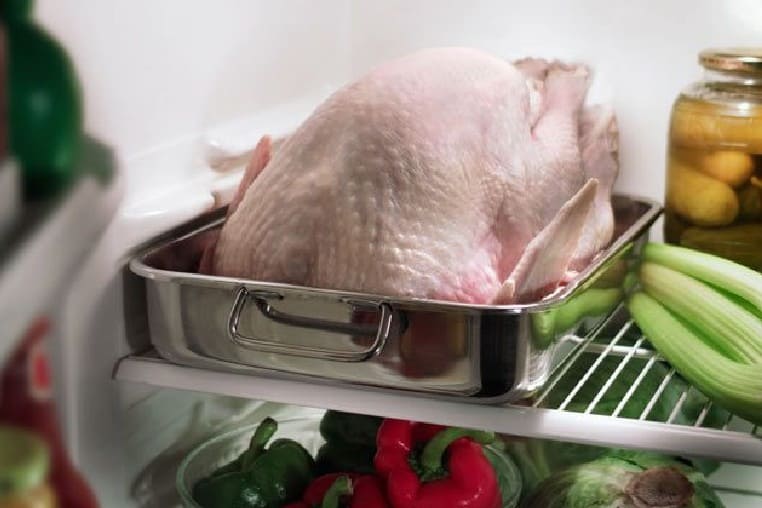Poultry meat is consumed in almost every part of the world and is one of the most consumed types of meat globally. Thus there must be a lot of inquiries when it comes to storage and preparation, including “Can I refreeze chicken?”
Refreezing Chicken: Is It Okay?

There are times when you thaw chicken and suddenly change your mind. Suddenly, you don’t want to have chicken for your meal anymore. In these cases, you might ask if it’s okay to refreeze a thawed chicken. The answer depends on specific conditions and circumstances.
Yes, you can refreeze it within a certain amount of time. It would be best if you immediately refroze it as long as you realize that you won’t be using it. Well, there can be times when you know it is too late; what do you do by then? There’s a limit as to up until how long you can refreeze your chicken and with other factors affecting it too.
The first factor is time, and some of the other factors are the environment and temperature. When you have thawed your chicken in the fridge, you have up to one to two days when you can still refreeze it.
While the refrigerator keeps the chicken cool, after a certain period, the meat may become contaminated with bacteria. When your meat has reached two days inside the fridge, it’s time to take it out and do not use it anymore.
However, it’s a different story when you thaw the chicken at room temperature, for example, on your kitchen counter, it’s not advisable, and it’s easier for the meat to go bad.
The temperature of the environment in which the chicken was thawed is also a factor to consider. You should not refreeze chicken that’s been thawed in areas with temperatures higher than 5 degrees celsius. You can only refreeze thawed chicken that has been stored in places less than 5 degrees celsius and in the maximum span of 24 hours.
The Three Safe Thawing Methods
According to the United States Department of Agriculture (USDA), the following are the three safe thawing methods:
Refrigeration
This is when you thaw inside the fridge. It’s important to note that this is the safest way to thaw your chicken. Make sure that the temperature is below 40 degrees Fahrenheit or 4.4 degrees celsius.
Cold Water
This method is easy but will require patience and extra effort. The first step is to prepare cold water where you can submerge your frozen chicken. Extra effort is needed as you will need to be replacing the cold water every 30 minutes.
Microwave
This is one of the quick ways to defrost a chicken. You only need to place your chicken in a microwave-safe dish before putting it inside the microwave and clicking the defrost button/switching to the defrost setting. Ensure that you rotate the chicken to achieve an even thaw.
Note: Defrosting chicken in a cold environment like in cold water and defrosting through microwaving still allows some harmful bacteria to nest, grow, and contaminate the meat. Thus, if you ever decide to defrost using either of both methods, be sure to cook the chicken before refreezing.
Things To Avoid When Defrosting

While there are things advised, there are also things that are not recommended. There are methods people may think are harmless but actually pose a danger to them and their health.
- Do not defrost on the countertop – Bacterias are present and thrive at room temperature. When you defrost at room temperature, bacteria contaminate the chicken. Meat left at room temperature for too long should not be used. Consequently, it should never be refrozen as well.
- Do not rinse chicken in running water – Running water can cause a lot of splashes not only on your counter but in the nearby vicinity too. Rinsing your chicken in running water can cause bacteria to be splashed around the counter, utensils, kitchen floor, and in other places. This increases the risk of cross-contamination.
The Changes Whenever You Refreeze Chicken Meat
As the chicken meat undergoes the process of going back and forth to the freezer, the water content changes too. As you freeze and refreeze the chicken meat, it loses its moisture. Of course, as the process repeats, more moisture is lost, and so forth.
This gives you an idea of what it means to buy frozen chickens in markets. While they are kept there, moisture is already lost. And so, you can calculate how dry further the chicken gets as you take the chicken meat home, freeze it, and refreeze it.
Tips on Refreezing and Storing Your Chicken Meat
There is always a right way to do processes. This is true in our food preparation and storage. As mentioned earlier, moisture is affected as well as the overall quality of the chicken meat. In these cases, is there a way to maximize the freshness and keep chicken meat in the best quality possible? The following are some tips.
- Refreeze as quickly as possible – The quicker you decide that you are not using the chicken and refreeze it, the more essence and freshness you get to retain.
- Freeze quickly – This means that you do not slow down when freezing chicken. Slow freezing can cause lumps, large ice crystals to form. These can cause the chicken to be dry and tough.
- Use shallow containers – As mentioned above, you need to get your chicken meat frozen quickly. A way to help speed up the process is by placing the meat in a shallow container.
- Keep it at 0°F (-18°C) – Make sure the temperature is 0°F or -18°C when you store your chicken meat to prevent spoilage and retain the quality.
- Use air-tight packaging – This helps in preventing the meat from having freezer burns. Freezer burns are caused by prolonged exposure to air. Why avoid freezer burns? These burns have an impact on the chicken’s taste, color, and texture.
Summary
Refrozen chicken can maintain its quality for 9-12 months in the freezer. On the other hand, cooked chicken can last up to four months. If you thaw and refreeze chicken, ensure it’s done promptly to maximize its storage life.


Joseph Hudson has been raising chickens for over 15 years. In 2018, he completed the Agriculture & Natural Resources program at Mt. San Antonio College. He currently raises over 1400 chickens on his 7.5-hectare farm. He keeps sharing his experience on raising healthy and happy chickens on Chicken Scratch The Foundry.







